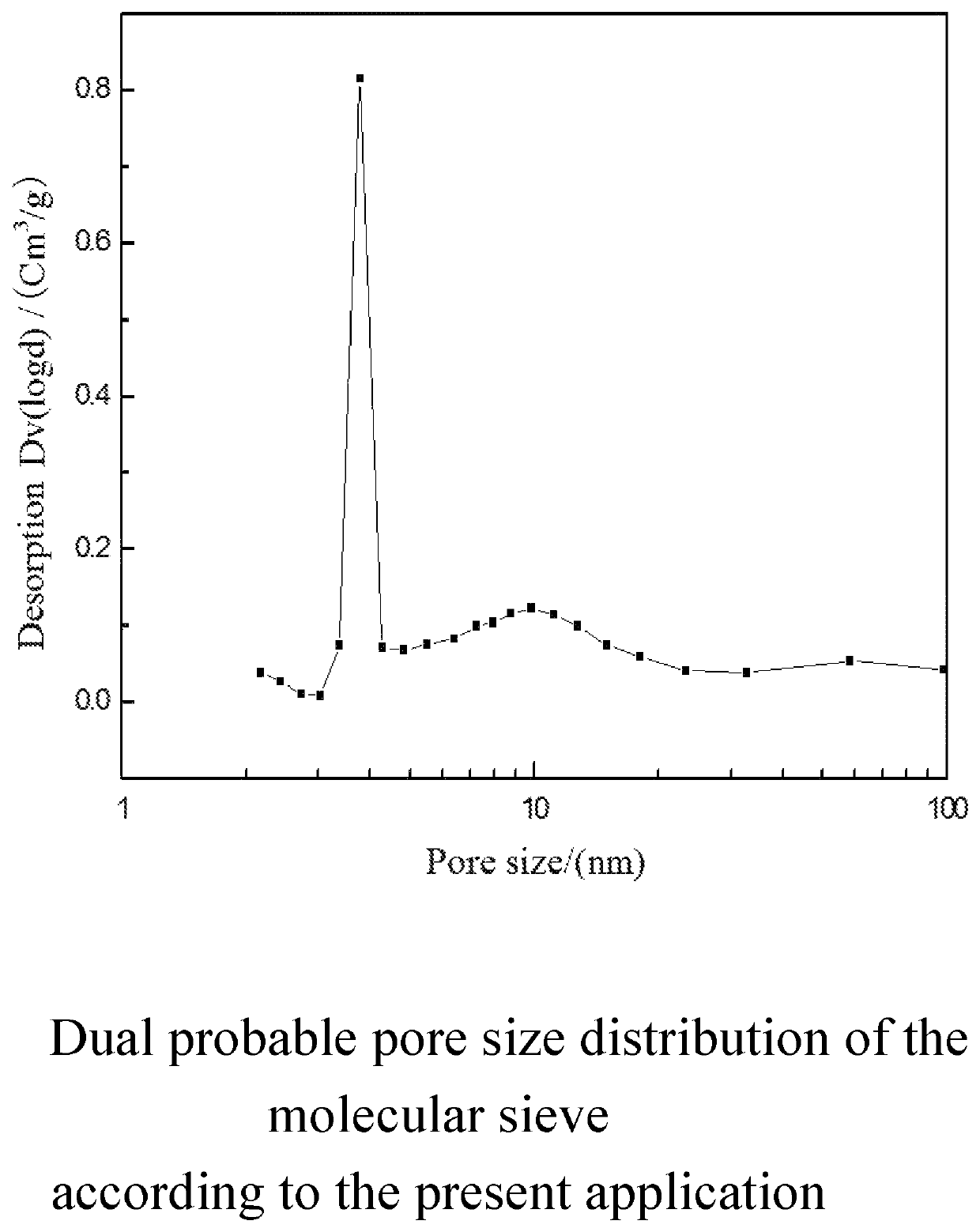Catalytic cracking catalyst and preparation thereof
a cracking catalyst and catalytic technology, applied in the field of catalytic cracking catalysts, can solve the problems of serious loss of molecular sieve crystallinity, poor thermal stability, and major obstacle to the active center of the catalyst, and achieve the effect of improving coke selectivity and cracking activity
- Summary
- Abstract
- Description
- Claims
- Application Information
AI Technical Summary
Benefits of technology
Problems solved by technology
Method used
Image
Examples
example 1
[0170]2000 kg (weight on a dry basis) NaY zeolite with a framework SiO2 / Al2O3 ratio of 4.6 (sodium oxide content 13.5 wt %, Qilu Branch of Sinopec Catalyst Co., Ltd.) was added to a primary exchange tank containing 20 m3 of water and stirred evenly at 25° C. Then, 600 L of RECl3 solution (the rare earth concentration calculated on the basis of RE2O3 in the RECl3 solution was 319 g / L) was added, and stirring was continued for 60 minutes. The mixture was filtered and washed, and the filter cake was sent to a flash drying oven for drying; a rare earth modified Y-type molecular sieve having a normal lattice constant and a reduced sodium oxide content was obtained, which had a sodium oxide content of 7.0% by weight and a lattice constant of 2.471 nm. Then, the molecular sieve was sent to a roaster and roasted at a temperature of 390° C., in 50% steam atmosphere (an atmosphere containing 50% by volume of steam) for 6 hours, then roasted at a temperature of 500° C., in a dry air atmosphere...
example 2
[0176]2000 kg (weight on a dry basis) NaY zeolite with a framework SiO2 / Al2O3 ratio of 4.6 (sodium oxide content 13.5 wt %, Qilu Branch of Sinopec Catalyst Co., Ltd.) was added to a primary exchange tank containing 20 m3 of decationized water, and stirred evenly at 90° C. Then, 800 L of RECl3 solution (the rare earth concentration calculated on the basis of RE2O3 in the RECl3 solution was 319 g / L) was further added, and stirring was continued for 60 minutes. The mixture was filtered and washed, and the filter cake was sent to a flash drying oven for drying to obtain a rare earth modified Y-type molecular sieve having a normal lattice constant and a reduced sodium oxide content, which had a sodium oxide content of 5.5% by weight and a lattice constant of 2.471 nm. Then, the molecular sieve was sent to a roaster and roasted at a temperature (atmosphere temperature) of 450° C. in a 80% steam atmosphere for 5.5 hours; then, the molecular sieve material was passed to a roaster for roasti...
example 3
[0181]2000 kg (weight on a dry basis) NaY zeolite with a framework SiO2 / Al2O3 ratio of 4.6 (sodium oxide content 13.5 wt %, Qilu Branch of Sinopec Catalyst Co., Ltd.) was added to a primary exchange tank containing 20 m3 of decationized water, and stirred evenly at 95° C. Then, 570 L of RECl3 solution (the rare earth concentration calculated on the basis of RE2O3 in the RECl3 solution was 319 g / L) was further added, and stirring was continued for 60 minutes. Then, the mixture was filtered and washed, and the filter cake was continuously sent to a flash drying oven for drying to obtain a rare earth modified Y-type molecular sieve having a normal lattice constant and a reduced sodium oxide content, which had a sodium oxide content of 7.5% by weight and a lattice constant of 2.471 nm. Then, the molecular sieve was sent to a roaster and roasted at a roasting temperature of 470° C. in an atmosphere containing 70% by volume of steam for 5 hours; then, the molecular sieve material was pass...
PUM
| Property | Measurement | Unit |
|---|---|---|
| lattice collapse temperature | aaaaa | aaaaa |
| pore size | aaaaa | aaaaa |
| molar ratio | aaaaa | aaaaa |
Abstract
Description
Claims
Application Information
 Login to View More
Login to View More - R&D
- Intellectual Property
- Life Sciences
- Materials
- Tech Scout
- Unparalleled Data Quality
- Higher Quality Content
- 60% Fewer Hallucinations
Browse by: Latest US Patents, China's latest patents, Technical Efficacy Thesaurus, Application Domain, Technology Topic, Popular Technical Reports.
© 2025 PatSnap. All rights reserved.Legal|Privacy policy|Modern Slavery Act Transparency Statement|Sitemap|About US| Contact US: help@patsnap.com

